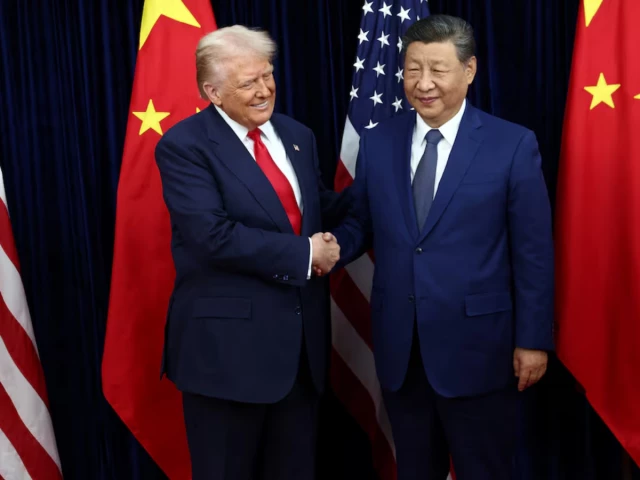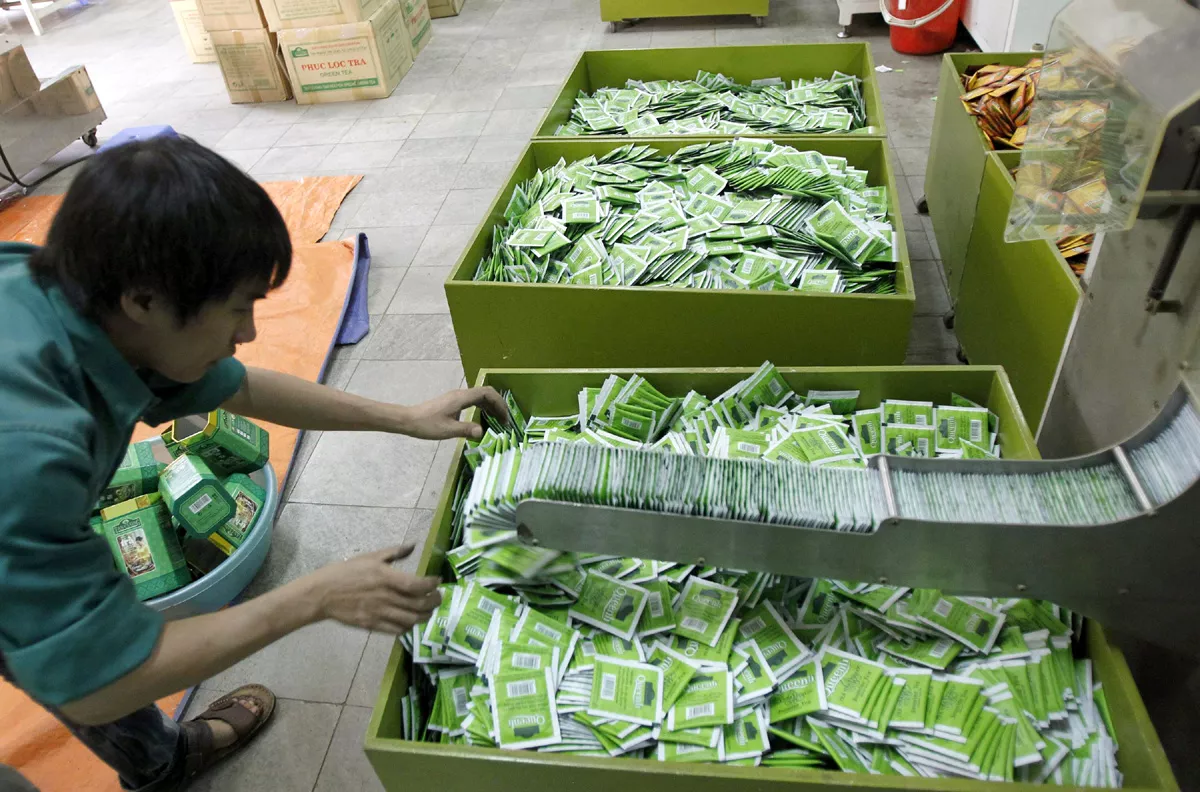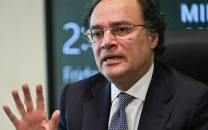Busan summit hits pause on great trade duel
Tariff cut is seen as political gamble for Trump, who touted duties as most potent tool for pressuring China

A trade slugfest between the world's two largest economies appears to have paused. President Donald Trump and his Chinese counterpart Xi Jinping met last week at South Korea's Busan airfield in a bid to dial back trade frictions and duelling export controls stemming from Trump's protectionist sabre-rattling.
The US president said they have agreed on "almost everything" and that a formal trade deal could be signed "pretty soon." Xi also hailed the "consensus" evolved on resolving "important economic and trade issues", calling for both sides to "refine and finalise follow-up work as soon as possible," uphold the agreement, and deliver tangible results.
Coming ahead of the 32nd APEC summit in Gyeongju, it was the first in-person meeting between the two leaders since Trump's re-election, following three phone calls and multiple letter exchanges over the past few months. It followed trade negotiations on the sidelines of the Asean summit in Kuala Lumpur. Interestingly, the Busan summit was shorter than expected – lasting just one hour and 40 minutes, suggesting that both sides focused primarily on issues already settled during the Kuala Lumpur talks.
Trump provided glimpses into the summit outcomes. China, according to him, has agreed to defer its export controls on five rare earth metals. In return, Washington will cut its fentanyl-related tariff from 20% to 10%, lowering overall tariffs on Chinese goods from 57% to 47%. China will also resume US soybean purchases and pause countermeasures linked to the US Section 301 investigation for a year.
Both countries will suspend new tech export controls and port fees. Trump will tour China in April, with Xi expected to visit the US later. Officially, Beijing didn't share specifics of the deal. Instead, the Chinese commerce ministry released the outcomes of the Kuala Lumpur talks that "formed the backbone" of the Busan summit and reflected "the spirit of equality, respect, and mutual benefit".
Let's examine why these measures were important. First, semiconductors, which are essential for AI development, have stoked US-China tensions since Washington restricted exports of advanced computer chips. Nvidia, whose processors dominate global AI systems, is at the centre of the dispute, with its new Blackwell AI chips included in US export bans.
The American move was motivated by a desire to maintain its dominance in the AI race. The Busan agreement, however, signals Trump's willingness to discuss China's access to these chips. Beijing will hold talks with Nvidia and other US chipmakers, Trump said – though the next-generation Blackwell AI chip will remain off the table.
Second, rare earths – a group of 17 metallic elements – are essential for producing everything from smartphones to military weaponry, warplanes, and tanks. The US is heavily reliant on China, which dominates global refined production of these critical minerals. At Busan, China's decision to delay export restrictions is seen as a significant concession for Trump, who considers the supply of rare earths as a critical national security issue.
Third, China's halt of US soybean purchases during the on-and-off trade war hurt American farmers, especially in the US Midwest – a key part of Trump's political base. Soybeans are the top US agricultural exports, and China is among the largest buyers. Beijing has now agreed to resume purchases – something Trump could flaunt back home as a symbolic political win.
At the meeting, Xi struck a conciliatory yet confident tone. "China and the United States can jointly shoulder responsibility as major countries and work together to accomplish more great and concrete things for the good of our two countries and for the whole world," he said, stressing that "dialogue is better than confrontation."
The tariff cut is seen as a political gamble for Trump, who has long touted these duties as the most potent tool for pressuring China. His previous rounds of "reciprocal" tariffs had raised billions in revenue but also triggered retaliatory measures from Beijing that hurt American farmers, manufacturers, and consumers. At Busan, Trump cast the move as a strategic step rather than a retreat. "We will make both China and the US even better," he said. "Together, our two countries can get many great things done for the world and have many years of success."
For both sides, the deal brings badly needed economic relief. For the US, the tariff rollback could ease inflationary pressures that have persisted since 2021. American consumers and importers have borne much of the cost of tariffs, with prices for electronics, machinery, and household goods rising steadily. The White House hopes that lowering import duties on Chinese goods will help tame inflation and bolster Trump's political standing ahead of next year's midterm elections.
Some economists agree with this assessment. "The tariff relief is actually good news for consumers – it is substantial," Mary Lovely, a senior fellow at the Peterson Institute for International Economics, told AP. It also helps US companies that may have been considering shifting their sourcing to other countries because of steep tariffs on Chinese imports.
But not everyone does. Einar Tangen, a senior fellow at the Taihe Institute in Beijing, said Trump's decision to scale back the tariffs "means nothing". "Any economist will tell you, tariffs at 30% or above mean that you effectively end trade," he told Al Jazeera.
Meanwhile, support for Trump's China brinkmanship is waning, with more Americans seeing trade frictions as detrimental to both nations. A recent CGTN poll found that 87% of Americans see China-US economic relations as mutually beneficial, while 84.4% believe that closer cooperation between the two economies safeguards global supply chain stability.
If Trump's tariffs aimed to coerce China, they largely failed, as Beijing swiftly diversified its export markets to mitigate the impact. China's economy grew by 5.2%, with trade rising 4%, despite both domestic and global challenges, Xi told Trump. "The Chinese economy is like a vast ocean, big, resilient and promising. We have the confidence and capability to navigate all kinds of risks and challenges."
Nonetheless, China's economy was not immune to the effects of Trump's high tariffs. The US remains one of the largest markets for Chinese exports with trade between the two reaching $688.28 billion in 2024, according to UN data. The Busan deal is likely to ease the export strain that has weighed on China's manufacturing sector. Xi told Trump that trade should remain the anchor and driving force of bilateral relations, rather than a source of friction between their two nations.
For now, both sides appear to have taken some of their biggest guns off the table. Yet the truce remains fragile amid the lack of clarity over Trump's China strategy. Analysts say it is unclear whether his objectives are to defend US industries, secure technology, punish Chinese practices, or curb China's rise. If driven by geopolitical necessity, Xi has sought to reassure Trump at Busan that China does not seek to challenge or replace any other country because "the world is big enough for both China and the United States to succeed."
The writer is an independent journalist with special interest in geoeconomics






















COMMENTS
Comments are moderated and generally will be posted if they are on-topic and not abusive.
For more information, please see our Comments FAQ